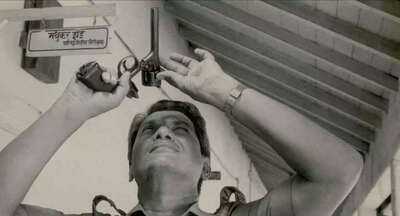 A Fascinating Documentary on a Mumbai Legend
A Fascinating Documentary on a Mumbai Legend
Filmmaker Akshay Shah has captured the attention of many Indians with his documentary focusing on the intriguing life of retired Crime Branch officer Madhukar Zende, who is known for capturing the notorious criminal Charles Sobhraj not once, but twice.
In Zende, Shah presents an engaging narrative that features conversations with the energetic octogenarian. The film showcases Zende's self-awareness and willingness to humorously embrace his image as one of Mumbai's first 'super cops.'
Zende's charisma shines through as he engages with the documentary's light-hearted tone, even showcasing his fitness by posing shirtless on a beach. His remarks are delivered with flair, reminiscent of a film script.
On his own persona, Zende states, “I am a person of action!” Regarding the super cop phenomenon, he quips, “There’s nothing like a super cop. Everybody’s a cop.” When discussing his connection to Sobhraj, he asks, “How long will you go on about it?”

The documentary includes archival materials, such as a Marathi comic book featuring Zende, highlighting his influence on popular culture. Shah remarked, “The fascination began with Sobhraj like many others, but it ended the day I sat across Zende sir. His nonchalant simplicity is plenty fascinating.”
Zende is set to premiere on October 31 at the Mumbai Film Festival, which continues until November 5. The film revisits Zende's past, including his former home and office, while he reflects on his early police career, inspirations, and significant cases.
While Zende's encounters with Sobhraj are notable, both the filmmaker and the subject emphasize that these events are just a small part of his extensive career. Zende humorously laments being labeled “the Sobhraj man,” asserting, “Sobhraj was a minor part of my life.”
Shah aims to portray Zende as a model law enforcement officer, contrasting him with the corrupt figures often depicted in media. The film highlights Zende's contributions in Dharavi and his role in managing communal tensions during the 1992 riots. The lively musical score by Sneha Khanwalkar features a song celebrating Zende's work in Dharavi.

Shah noted, “Bollywood often glorifies encounter specialists,” referring to officers known for their violent methods. “Zende represents a different philosophy—working with the community and promoting peace. While it may not fit the typical Bollywood narrative, it certainly defines a great policeman.”
The documentary could have easily turned into a typical action film, but Shah wanted to break away from conventional storytelling. “The film’s concept started as a commercial project with a big star, but all Bollywood cop films are repetitive. We aimed for something experimental, and Zende embodies that.”
Shah reached out to Zende, who resides in Pune, after reading a book about him. A simple email was enough to persuade Zende to participate in the documentary.
“Filmmaking usually involves scripts and schedules, but Zende followed his instincts,” Shah explained. “We had no script or timeline; we simply followed his lead. This spontaneous approach allowed us to rediscover Bombay in a unique way.”
Shah dedicated two years to researching various archives, consulting experts like Deepak Rao, who provided valuable insights into the police force and Mumbai's history. “The most intriguing discovery was Zende's 14-page report on the Bombay underworld,” Shah shared.
AI technology was utilized to recreate images of some individuals Zende encountered during his career from 1960 to 1996, including notorious crime figures like Haji Mastan and Karim Lala.
“We created stories that were not documented using AI,” Shah stated. “I believe AI can enhance filmmaking without compromising its essence. Non-fiction can greatly benefit from AI to overcome real-life limitations.”
